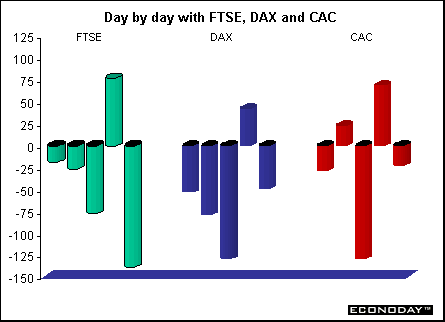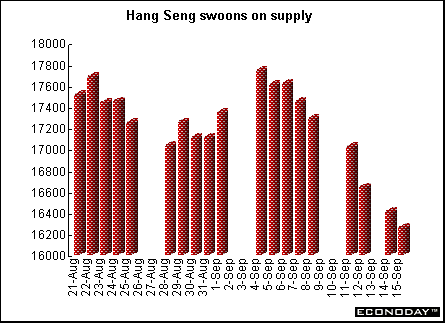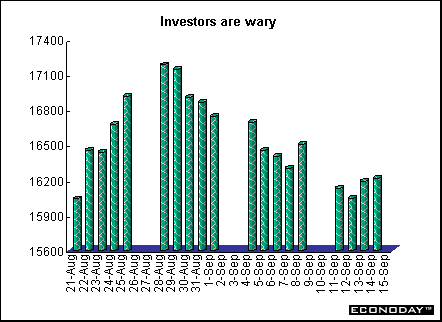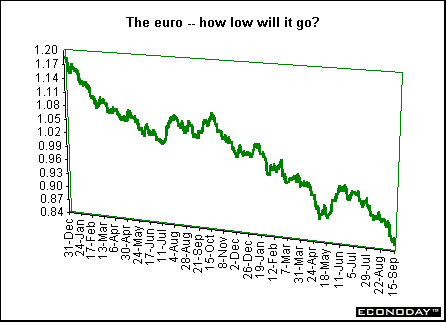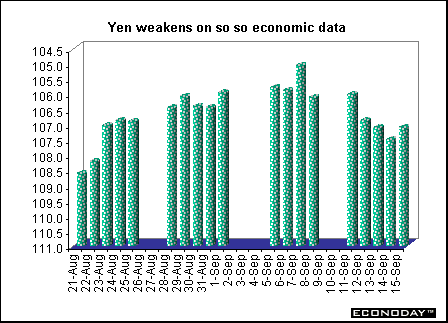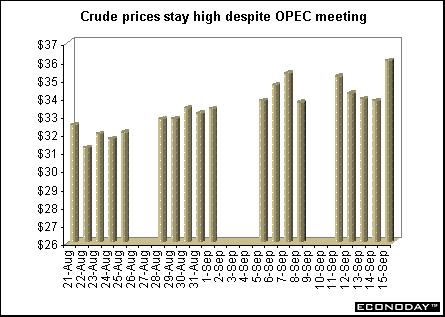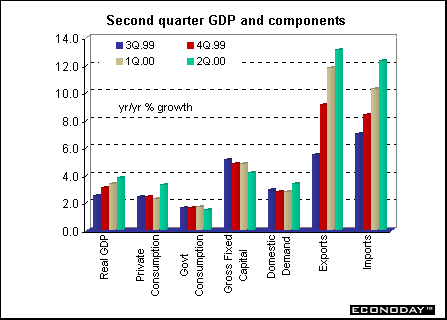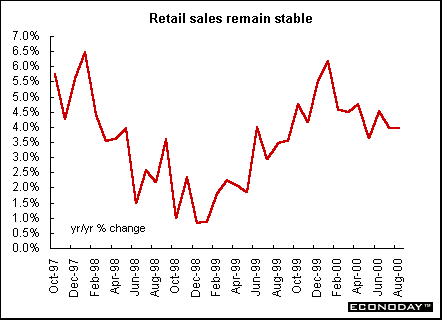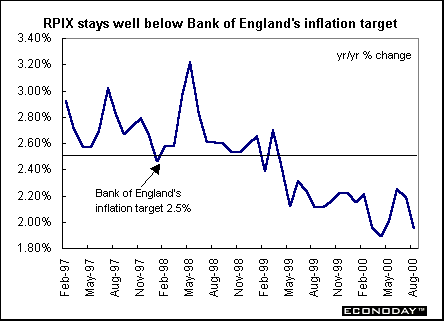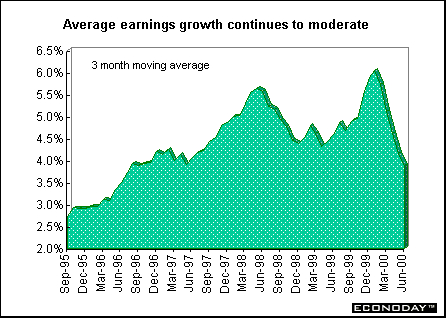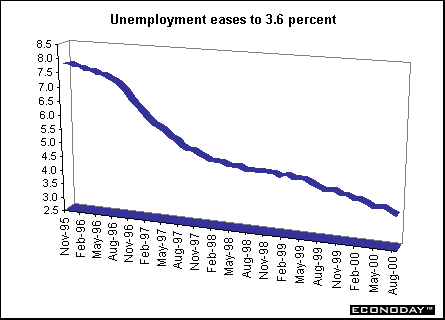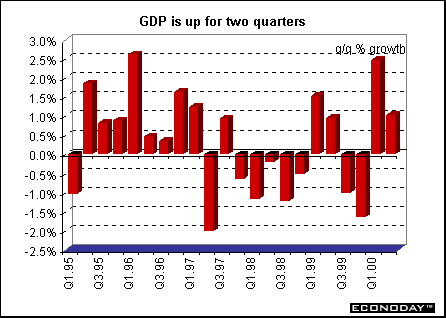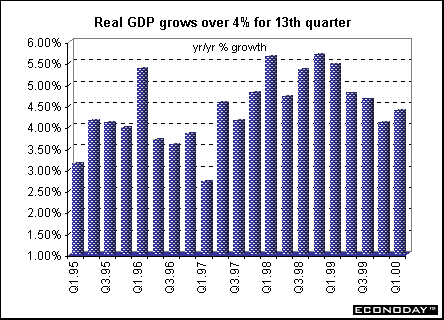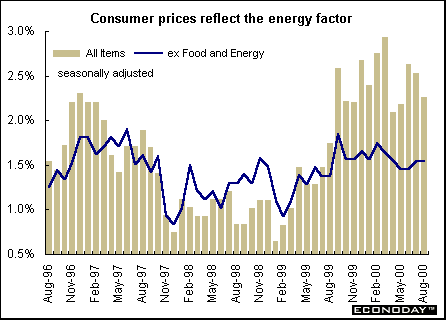| Previous Articles |
|
Oil, tropical storms, the euro and earnings don't mix Investors worried about corporate earnings. Third quarter earnings linked to the weak euro and the high price of oil, addled equity markets as some international companies said that earnings would be hit by weak overseas currencies. It rattled investors and dragged down old economy stocks and limited a technology sector rebound. Technology stocks fueled a sharp selloff Friday as a new spike in oil prices and a sinking euro heightened investors' concerns about corporate profits. Of the markets tracked here, only the Toronto Stock Exchange composite 300 managed to gain on the week, rising 2.25 percent. The Australian all ordinaries broke even. The remaining indexes, especially the Hong Kong Han Seng, sank with a thud.
South Korean markets were closed Monday, Tuesday and Wednesday. Europe and Britain
Investors remained skeptical that the increase in energy production beginning October 1 by OPEC producers would bring crude prices down. As a result, oil prices soared to heights not seen for 10 years. (See below) When the week finally ended, all three indexes were battered by investor doubts. The London FTSE 100 was down 183.40 points or 2.78 percent to close at 6417.30. The Paris CAC sank 88.71 points or 1.32 percent, ending the week at 6614.65. The Frankfurt DAX was the worst performer of the three. It ended the week at 6999.54, down 268.23 points or 3.69 percent. Asia
Japanese investors were disappointed by the less than expected growth in gross domestic product because government expenditures accounted for most of the increase while investment was down. The only ray of sunshine was that consumer spending was positive. (See indicator scoreboard below.) Investors also continued to fret over the continuing high number of bankruptcies being reported. As the three day weekend approached, with markets closed on Friday, investors lost interest. The Nikkei 225 closed the week at 16,213.28, down 288.27 points or 1.75 percent.
Currencies
Contributing to the rhetoric was the Richmond Federal Reserve Bank president, who said that while he expects the euro to survive, the drop in value might spark inflation. And this raises concern for the euro's longer term viability. Traders sold the euro. The yen ebbed lower, as investors sifted through the gross domestic product data. Most of second quarter growth stemmed from government spending. Despite this, the yen remains bolstered by exporters repatriating earnings prior to the end of the third quarter.
Crude prices rise despite OPEC's promise of increased production
Although the Organization of Petroleum Exporting Countries (OPEC) agreed to pump 800,000 barrels a day more to help cool oil prices, dealers said the markets remained jittery. As evidenced by the graph above, prices didn't come down on the news. U.S. crude stocks are still at very low levels while strong gasoline demand from a record driving season means refiners have little capacity for other products. One consequence of this is that heating oil supplies remain dangerously limited ahead of winter, when demand usually surges. Indicator scoreboard
Germany - August wholesale prices rose 0.1 percent and 5.6 percent when compared with last year. A sharp decline in seasonal food prices offset a modest increase in oil prices. Wholesale price index excluding seasonal foods rose 0.4 percent on the month and 5.8 percent on the year. Excluding combustibles and motor fuels, wholesale prices fell 0.1 percent on the month and rose 3.1 percent on the year. France - August consumer prices rose 0.2 percent and 1.8 percent when compared with last year. On a seasonally adjusted basis, the CPI was up 0.1 percent on the month and 1.8 percent on the year. The CPI, excluding administered prices and volatile sectors like food and energy, rose 0.2 percent and 1.3 percent on the year. Excluding energy, the unadjusted CPI was up 0.2 percent on the month and 0.9 percent higher on the year. July seasonally adjusted merchandise trade deficit was E817 million. This was the first time in over six years that the trade balance was negative. Exports dropped 9.6 percent while imports were down 3.2 percent. For the three months through July, exports were still up 1.9 percent compared to the previous three month period and 12.8 percent higher on the year. For the three months through July, imports were up 3.1 percent compared to the previous three-month period and 18.9 percent higher on the year. Britain - August seasonally adjusted retail sales volumes rose 0.6 percent on the month and 4.0 percent above the level a year ago. The data for July were also revised up slightly and now it is estimated that sales volumes rose by 0.1 percent on the month. In the three months to August, sales volumes rose 1.1 percent on the previous three months and were 4.2 percent higher than on the same period a year ago.
August seasonally adjusted output prices were down 0.2 percent because of falling crude oil prices but were up 2.5 percent on the year. This was the biggest monthly drop since May 1986. Seasonally adjusted core output prices (which excludes food, beverages, tobacco and petroleum) were up 0.1 percent on the month and 1.3 percent on the year - the highest rate since August 1996. Seasonally adjusted input prices were up 0.6 percent on the month and by 10.7 percent on the year. Crude oil prices rose 3.9 percent on the month and 54.3 percent on the year. On an unadjusted basis, input prices were up 0.6 percent on the month and up 10.8 percent on the year. August retail price index excluding mortgages (RPIX) fell 0.1 percent but rose 1.9 percent when compared with last year. Lower gasoline and oil prices helped push the RPIX even further below the 2.5 percent government inflation target. The retail price index (RPI) was unchanged on the month and up 3.0 percent on the year. The RPIY which excludes both mortgage interest payments and indirect taxes fell by 0.1 percent on the month and was up 1.5 percent on the year.
July average earnings rose 3.8 percent when compared with a year earlier. Average earnings in the three months to July rose 3.9 percent. Bonuses, which had pushed earnings higher than the 4.5 percent Bank of England target in the early part of the year, were lower and depressed overall earnings growth. July private sector earnings growth dropped back to 4.0 percent from 4.2 percent in June while public sector earnings growth fell to 3.4 percent from 3.7 percent in June. Earnings growth in the manufacturing sector remained unchanged at 4.7 percent, while it rose to 3.5 percent in the service sector from 3.4 percent in June.
August unemployment rate slipped to 3.6 percent, down from 3.7 percent in July. This is the lowest unemployment rate since October 1975. The unemployment rate as defined by the International Labor Organization stood at 5.3 percent, down from 5.5 percent in the previous three months. The employment level in the three months to July rose 93,000 on the previous quarter and was up 354,000 on the same period a year earlier.
Asia
July revised industrial production fell 0.9 percent from the previous month. On the year, industrial production rose 4.2 percent, revised down from the previously estimated 4.4 percent. Production capacity, before adjustment for seasonal factors, was down 0.1 percent during July bringing the index for the category to 98.9, its lowest level since the ministry adopted its current standards for calculating the data in 1995. Production capacity was also down 1.5 percent from the same month a year earlier. The shipments sank 1.8 percent. Australia - Second quarter gross domestic product rose 0.7 percent and 4.7 percent when compared with a year ago. Government spending on buildings, roads and equipment fell 19.4 percent from the first three months of the year. The chain price index, which measures overall price changes and not just at the consumer level, rose 0.5 percent in the second quarter and 2.3 percent from a year ago.
Americas
BOTTOM LINE The weak euro is sure to come up at the Group of Seven meeting in Prague next weekend. A problem for the ECB is the lack of support for intervention among some European finance ministers. And the likelihood of an international agreement on coordinated intervention is low.
Release dates are subject
to change. |
||||||||||||||||||||||||||||||||||||||||||||||||||||||||||||||||||||||||||||||||||||||||||||||||||||||||||||||||||||||||||||||||||||||||||||||||||||||||||||||||||||||||||||||||||||||||||||||||||||||||||||||||
